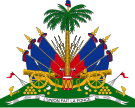| This article is part of a series on the |
| Politics of Haiti |
|---|
 |
Legislature |
Executive |
Judiciary |
Recent elections |
| Foreign relations |
General elections were held in Haiti on 22 September 1957. [1] Former Minister of Labour François Duvalier won the presidential election running under the National Unity Party banner, [2] defeating Louis Déjoie, [3] as well as independent moderate Clement Jumelle, who had dropped out on election day in a cloud of suspicions that the army was monitoring the election in favour of Duvalier. Former head of state Daniel Fignolé, considered a champion of poor blacks, was considered ineligible as he had been forcibly exiled months before the election, allegedly kidnapped.

Haiti, officially the Republic of Haiti and formerly called Hayti, is a country located on the island of Hispaniola, east of Cuba in the Greater Antilles archipelago of the Caribbean Sea. It occupies the western three-eighths of the island, which it shares with the Dominican Republic. Haiti is 27,750 square kilometres (10,714 sq mi) in size and has an estimated 10.8 million people, making it the most populous country in the Caribbean Community (CARICOM) and the second-most populous country in the Caribbean as a whole.

François Duvalier, also known as Papa Doc(Daddy Doc), was the President of Haiti from 1957 to 1971. He was elected president in 1957 on a populist and black nationalist platform. After thwarting a military coup d'état in 1958, his regime rapidly became totalitarian and despotic. An undercover government death squad, the Tonton Macoute, killed opponents indiscriminately, and was thought to be so pervasive that Haitians became highly fearful of expressing dissent, even in private. Duvalier further sought to solidify his rule by incorporating elements of Haitian mythology into a personality cult.
Pierre Joseph Louis Déjoie was a wealthy Haitian sugar planter, industrialist, agricultural engineer, landowner and politician.
Contents
Supporters of Duvalier also won the Chamber of Deputies elections. [4] Following the election, Déjoie went into exile in Cuba along with his supporters, fearing repression from Duvalier supporters. Haiti was not to see a free or semi-free election until after the fall of Duvalier's son Jean-Claude Duvalier in February 1986.

Cuba, officially the Republic of Cuba, is a country comprising the island of Cuba as well as Isla de la Juventud and several minor archipelagos. Cuba is located in the northern Caribbean where the Caribbean Sea, Gulf of Mexico and Atlantic Ocean meet. It is east of the Yucatán Peninsula (Mexico), south of both the U.S. state of Florida and the Bahamas, west of Haiti and north of both Jamaica and the Cayman Islands. Havana is the largest city and capital; other major cities include Santiago de Cuba and Camagüey. The area of the Republic of Cuba is 110,860 square kilometres (42,800 sq mi). The island of Cuba is the largest island in Cuba and in the Caribbean, with an area of 105,006 square kilometres (40,543 sq mi), and the second-most populous after Hispaniola, with over 11 million inhabitants.

Jean-Claude Duvalier, nicknamed "Baby Doc", was the President of Haiti from 1971 until he was overthrown by a popular uprising in 1986. He succeeded his father François "Papa Doc" Duvalier as the ruler of Haiti after his death in 1971. After assuming power, he introduced cosmetic changes to his father's regime and delegated much authority to his advisors. Thousands of Haitians were killed or tortured, and hundreds of thousands fled the country during his presidency. He maintained a notoriously lavish lifestyle while poverty among his people remained the most widespread of any country in the Western Hemisphere.





